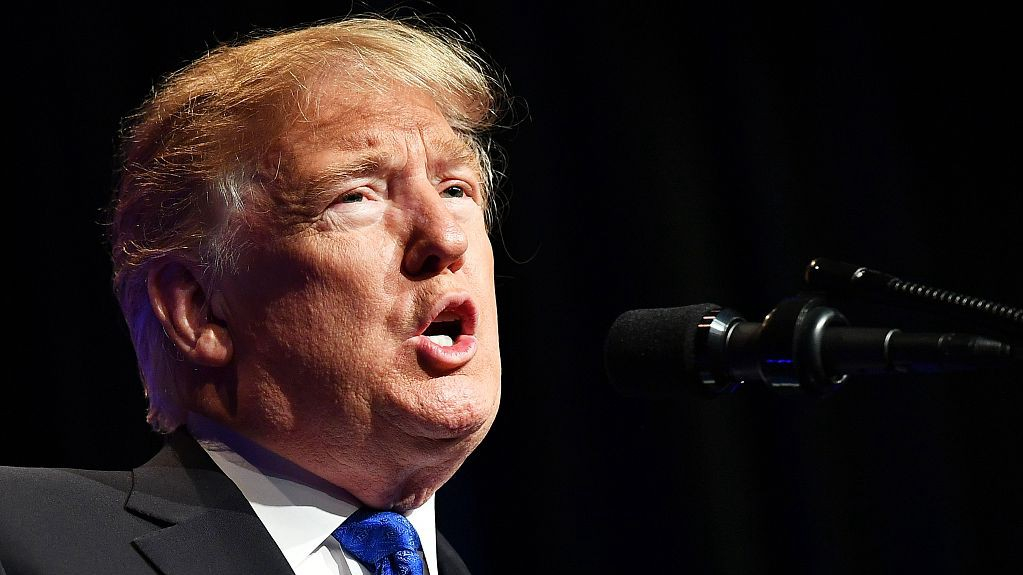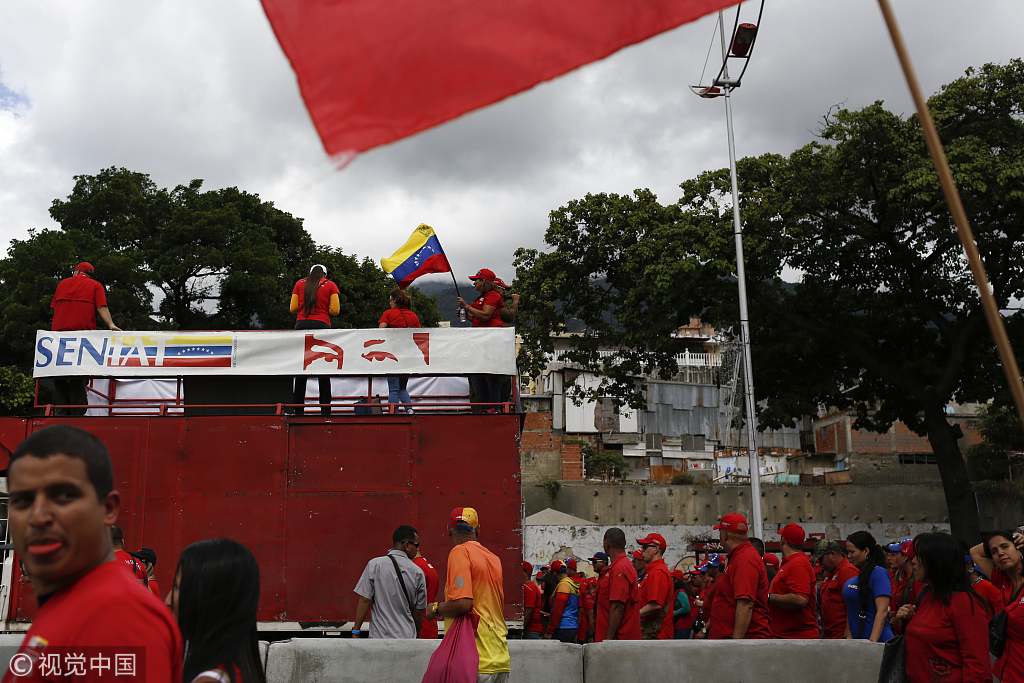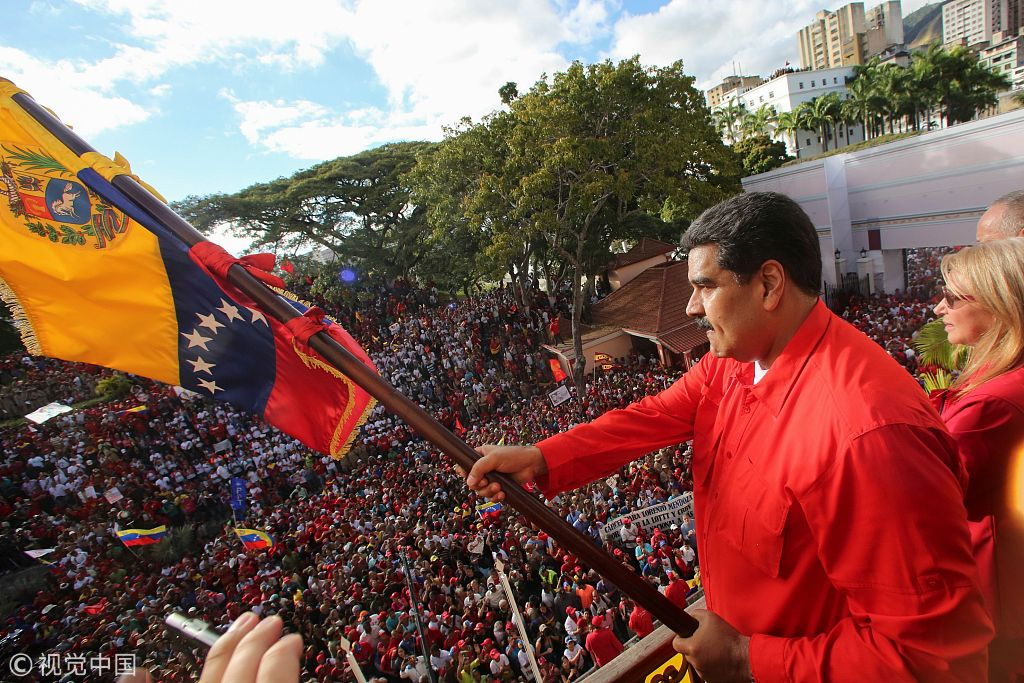
Opinion
11:04, 24-Jan-2019
Opinion: Monroe Doctrine in a new era
Tom Fowdy

Editor's note: Tom Fowdy graduated with an Msc. in Chinese Studies from Oxford University after previously majoring in Politics at Durham University. He has published a number of articles on the international relations of China and the Democratic People's Republic of Korea.The article reflects the author's views, and not necessarily those of CGTN.
U.S. President Donald Trump last night made an extraordinary declaration on Twitter, announcing that his country no longer recognizes the “illegitimate Maduro regime” of Venezuela. Instead, he claims that the president of the national assembly, Juan Guaido, is the rightful leader of the country.
The tweet came amid protests against the Maduro government within the country, on the back of a crippling fiscal crisis that has decimated the country's economy. Unsurprisingly, Western mainstream media around the globe began cheerleading the President's position and exaggerating the protests, and several countries (including Canada) jumped on the bandwagon to also switch to allegiance. The White House in turn is now threatening oil sanctions on the impoverished country to hasten their agenda.
Of course, for anyone even vaguely familiar with America's foreign policy, the bid to push a regime change in Latin America is not new. In fact, it's a consistent policy that has dated back for centuries.
Since the birth of the U.S. itself, Washington has sought to maintain absolute hegemony in the Americas. That is to create a closed order where no other power is entitled to maintain influence, nor may any regional country pledge its loyalty to anyone else. It began with the famous Monroe Doctrine in the early 19th century, where U.S. President James Monroe issued an ultimatum to European powers specifying that if they do not withdraw from the Americas, the U.S. would be even prepared to go to war to stop them.

A pro-government rally in support of President Nicolas Maduro in Caracas, Venezuela, January 23, 2019. /VCG Photo
A pro-government rally in support of President Nicolas Maduro in Caracas, Venezuela, January 23, 2019. /VCG Photo
Since that time, the U.S. has been remarkably ruthless in consolidating its power across the region. The rest of the 19th century saw it cut Mexico down to size and seize swathes of territory in its “manifest destiny” of Western expansion; whilst states such as Panama were carved out to maintain control over strategic points. By the 20th century, the U.S. sought to aggressively stomp out Soviet influence from the region.
This included numerous coup attempts (Cuba), outright invasions and bombings of several countries (Granada, Panama), as well as the installation of several authoritarian right wing regimes (El Salvador, Chile). Owing to the legacy of these conflicts and political upheavals, the socio-economic conditions of many countries in the region have suffered immensely; which is of course ironic, as some voices demonize the outward flows of immigration it creates.
Given this longstanding tradition of U.S. foreign policy, the Trump administration has made strengthening its hegemony in Latin America a priority. Since the administration took office, it has targeted what Nikki Haley described as “the authoritarian triad” of Cuba, Nicaragua and Venezuela for regime change.

President Nicolas Maduro waves a Venezuelan flag during a rally with supporters in Caracas, Venezuela, January 23, 2019. /VCG Photo
President Nicolas Maduro waves a Venezuelan flag during a rally with supporters in Caracas, Venezuela, January 23, 2019. /VCG Photo
Whilst outwardly the U.S. claims it is doing so in the name of democracy and human rights, it is about who these states align their preferences to. On the other hand, the U.S. is happy for a far-right government in Brazil to speak out against democracy, given that it is pro-America. Brazil's new president, Jair Bolsonaro's presence, is notable: his election strengthens U.S. leverage in the region, which is why we are seeing this happen now. The goal is to force regime changes in all three states - thus vanquishing all anti-American governments in the region.
Therefore, the crisis in Venezuela provides the perfect opportunity for the Trump administration to strike. Economic mismanagement combined with unreliable oil prices has created an economic crisis which has seen the country's economy crumble, with widespread food and supply shortages. It is not hard to see why the country is inherently unstable.
Yet, that does not justify the ends of Washington jumping in head first and attempting to fuel the crisis for its own gain. Despite the so called anti-Trump credentials of the media, we only find that as is the norm, they tend to follow the U.S. in setting the narrative and consolidating it.
Thus, as usual, large sections of the public believe Washington is only performing an act of moral duty in a typical good vs. evil conflict, failing to understand the geopolitical motives behind forcing a change of government when it has no business in doing so.
(If you want to contribute and have specific expertise, please contact us at opinions@cgtn.com.)

SITEMAP
Copyright © 2018 CGTN. Beijing ICP prepared NO.16065310-3
Copyright © 2018 CGTN. Beijing ICP prepared NO.16065310-3